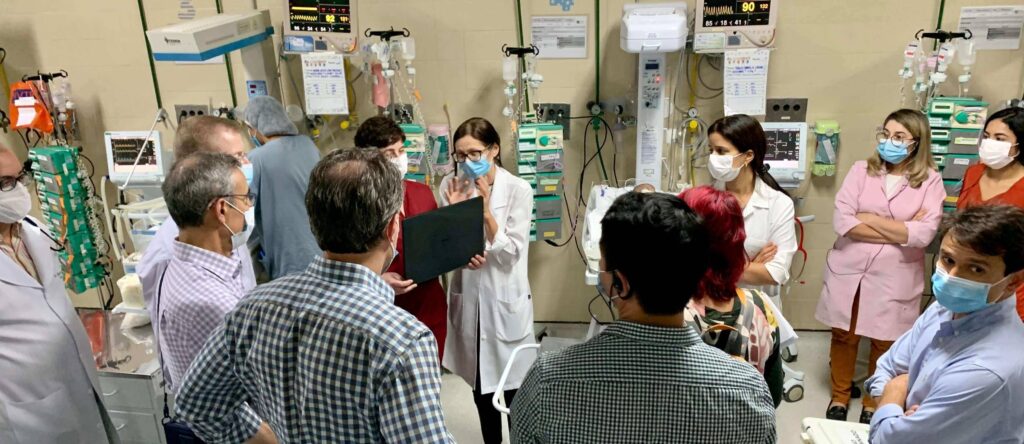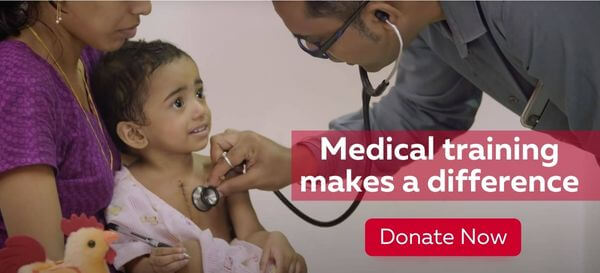Published April 3, 2023
Updated April 1, 2024
“You give us the strength and hope we need to keep going on. We have no doubt that this partnership is one of the main reasons we are and will be continuously improving every day!”
—Dr. Klebia Castello Branco, chief of pediatric cardiology, Hospital de Messejana, reflecting on the impact of Children’s HeartLink medical volunteers
We invite you to join our partner hospitals around the world in showering volunteers with gratitude during Volunteer Appreciation Month. Honor a volunteer or volunteer team with a donation in their name and leave a comment to express your heartfelt thanks for their tireless efforts – because every child deserves a healthy heart.
In 2023 alone, medical volunteers dedicated 5,100 hours of their time both in person and virtually to train heart care teams in six countries – Bangladesh, Brazil, China, India, Malaysia and Vietnam.
These heart care professionals generously share their time and knowledge to train clinicians and expand expertise of pediatric heart care worldwide, ultimately giving more children with heart disease a chance at living a life in which they can thrive.
Share a heartfelt thanks now and we’ll share your message with our volunteers.
Support Medical Trainings & Send Your Own Message of Gratitude
Need some inspiration? See messages of gratitude from our global hospital partners:
KOLKATA, INDIA
Dr. Rhitajyoti Sengupta, pediatric intensivist, Rabindranath Tagore International Institute of Cardiac Sciences (RTIICS) partnered with volunteers from Children’s Minnesota
We started our journey with Children’s HeartLink from 2016, and medical volunteers from Children’s Minnesota visited us several times physically over the years. With their help and guidance, we were able to set up robust protocol of ward to ITU [intensive therapy unit] handover, invasive line handling, awareness about hand hygiene and observing five moments of hand hygiene. And now, more confidently we could venture into more surgically complex cases like RACHS 3, RACHS 4, RACHS 5 cardiac surgeries with acceptable outcomes.
Notably, we should mention that Children’s Minnesota team members, registered nurses Alicia, Maggie and Jennifer also have given a boost for nursing empowerment, an online and offline education, to our PICU [pediatric intensive care unit] nursing team through our nursing residency program, and on-site and off-site visits. I must mention Children’s Minnesota team members physicians Dr. Overman, Dr. Dassenko, have given valuable inputs for first Nikaidoh operation done successfully in RTIICS. Dr. Dassenko guided us for practice changes to cuffed ET tube pediatric nasal prongs and high frequency nasal cannula use in post op. We, on behalf of RN Tagore [RTIICS] pediatric cardiology, surgery, pediatric intensive care, cardiac anesthesiology and the PICU nursing team, are thankful and grateful to Children’s HeartLink and Children’s Minnesota team for the wonderful and satisfying support to date.
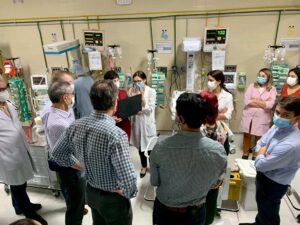
FORTALEZA, BRAZIL
Dr. Klebia Castello Branco, chief of pediatric cardiology, Hospital de Messejana, partnered with volunteers from Seattle Children’s Hospital
We can’t thank you enough for all your kindness and solicitude of leaving your home and traveling such long distances to teach us how to take better care of our children with congenital heart disease. You give us the strength and hope we need to keep going on. We have no doubt that this partnership is one of the main reasons we are and will be continuously improving every day!
See how Children’s HeartLink is transforming pediatric heart care in Brazil.
DHAKA, BANGLADESH
Dr. M Nurul Akhtar Hasan, intensivist, National Heart Foundation Hospital and Research Institute, partnered with volunteers from Leeds Children’s Hospital
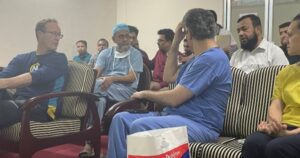
I was wondering how a volunteer team can fly thousands of miles to our country to help us, our hospital and our patients. But I am amazed to see that volunteers from Leeds Children’s Hospital have the capacity and good intention to bring positive changes to a hospital from a country in a totally different region of the globe in spite of so many differences and difficulties. We are forever grateful to them.
As a member of the pediatric cardiac team of my hospital I have the opportunity to work with Dr. David Finn, consultant pediatric intensivist, and volunteer nurse team led by Emor Miller. Looking at them, now I understand what volunteering is all about. They care about their mission so deeply, and step up to support the things they believe in regardless of the personal cost which make them an inspiration to us all.
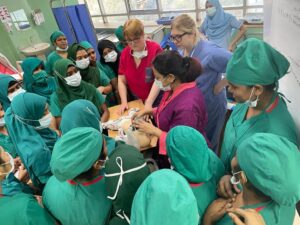
No words are enough to thank Leeds Children’s Hospital pediatric intensive care doctor and nurse team for the immeasurably valuable work they have been doing with us. They help us to understand our areas of improvement and at the same time encourage our care for children with congenital heart disease in resource-limited settings.
We are now more confident about our work and responsibilities. Our intensive care nurses are much more encouraged, motivated and empowered. I want to let our volunteers know that their dedication is essential to the work that we do. They help us ensure that we are meeting our mission. They bring ideas, positive energy and a beautiful intensity to the pediatric intensive care team of National Heart Foundation Hospital, Bangladesh.
HANOI, VIETNAM
Dr. Ngo Quoc Thai, staff physician, Heart Center, Vietnam National Children’s Hospital, partnered with volunteers from University of California San Francisco
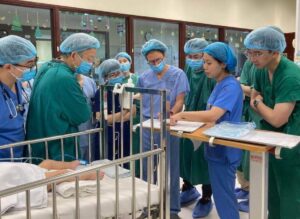
We express our sincere appreciation to Dr. Sarah Tabbutt and Dr. Mark Cocalis for consistently dedicating their time to visit us over the years. Their guidance has been immensely valuable. For us junior pediatric cardiologists, they have not only demonstrated efficient work practices according to standard protocols but have also aided us in navigating complex challenges with our available resources.
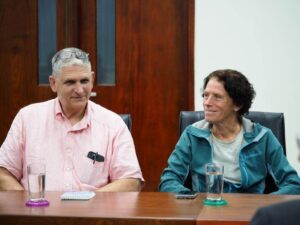
Their mentorship has not only motivated our professional development but has also sparked an interest in academic endeavors, offering support in research and scholarly writing. Furthermore, Dr. Tabbutt and Dr. Cocalis has always encouraged many of us to pursue studying abroad, resulting in many colleagues of ours now studying in India and Malaysia.
Through regular communication and mentorship, we now have gained confidence in delivering effective treatments to our patients and managing increasingly difficult cases.
See how Children’s HeartLink is transforming pediatric heart care in Vietnam.
SEPANG, MALAYSIA
Dr. Ghee Tiong Koh, pediatric cardiologist, and Dr. Norliza Ali, pediatric cardiologist, Sultan Idris Shah Hospital, partnered with volunteers from Birmingham Children’s Hospital
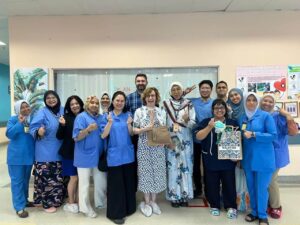
Dr. Fiona Reynolds has been very helpful and diligent in helping us transform the intensive care management (both clinical and nursing side) to be on par, and within the recommended standards of how an intensive care unit should be functioning. She also helps us recognize our strengths and weaknesses and how to overcome hurdles and crises in an intensive care set up.
Thank you, Dr. Fiona and all the team from Birmingham Children’s Hospital (and to Children’s HeartLink too!), for giving us the opportunity to be part of this wonderful collaboration. We certainly gained so much and are trying to improve all the time to achieve our goal of becoming a Children’s HeartLink Center of Excellence under this collaboration. Bouquet of roses to everyone!
Read how medical volunteers are empowering peers in Malaysia.
Support Medical Trainings & Send Your Own Message of Gratitude
Over the years, messages of gratitude have poured in from our hospital partners. Keep reading for more…
HOWRAH, INDIA
Dr. Debasis Das, Sr. Consultant Cardiac Surgeon, Narayana Superspeciality Hospital
My favorite memory with a medical volunteer is with Dr. David Overman when I first met him. This was in Rabindranath Tagore International Institute of Cardiac Sciences (the hospital where I worked previously), and I was not aware for a significant time in the operating room that he was there at the head end observing me do a Tetralogy Pulmonary atresia. Later on, when I descrubbed, I met him formally and got some great inputs.
We have understood the importance of teamwork from the medical volunteer teams and have taken some really constructive inputs. Also, nursing empowerment and its effect on outcomes has been an eye-opener and we are working on that continuously.
The blended learning model has given us more opportunities to interact and that is a major advantage. Also, it means staying in touch continuously, which enhances the relationship with the volunteer team.
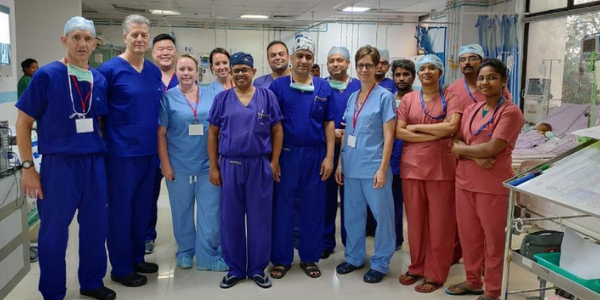
HANOI, VIETNAM
Dr. Nguyen Ly Thinh Truong, Chief of Cardiovascular Surgery Department, Director of Children Heart Center, National Children’s Hospital
I know Professor Sano through many articles in scientific journals. I met him a few times and was impressed with his knowledge and logic in reasoning about pathology and his insight into pathophysiology of congenital heart disease. The first time professor Sano came to Vietnam, he visited Bach Mai Hospital and Viet Duc Hospital according to a suggestion from the Ministry of Health. I tried to contact him and luckily got an appointment to meet him at Bach Mai Hospital. After almost 4 hours of waiting in the lobby of Bach Mai Hospital, I finally met the professor, and since then we have been in touch via email and started to lay the first bricks for our future partnership. That memory has always accompanied me throughout my working journey until now.
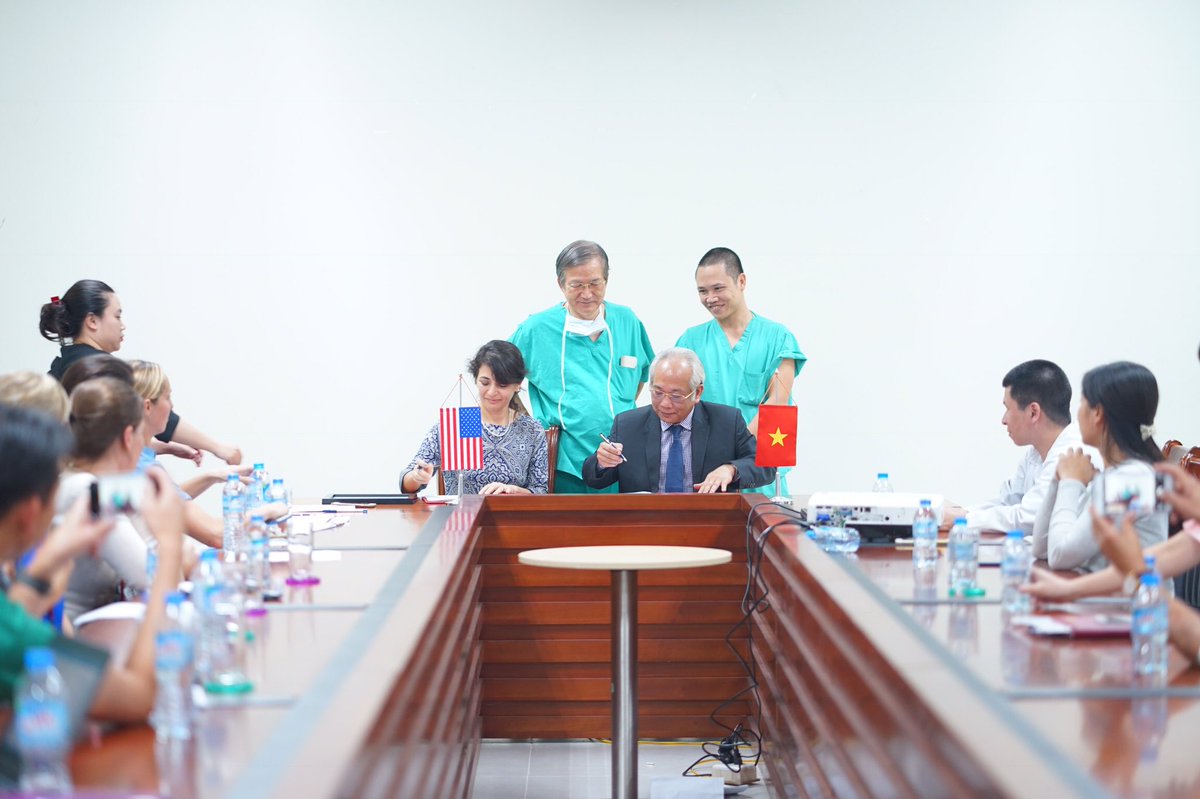
Patients with PA-VSD-MAPCA and ccTGA caused us a lot of trouble. Professor Sano teaches our entire team the foundations while tackling our issues and the methodology of complex procedures at the highest level in the clearest and most understandable terms. Using the fundamentals of pathology, we may learn more about each complex variety of congenital heart disease, boosting our comfort level while discussing and comprehending congenital heart disease. That provided us with important insight about how to save challenging congenital cardiac patients in Vietnam.
Our appreciation for the medical volunteer team’s assistance is beyond words. Action is the only way to convey that return. We recognize that the teachers and the logistical staff are willing to travel great distances, deal with language barriers, travel across different time zones and sacrifice everyone’s vacation time in order to help our team. These journeys are to us in our efforts to save more Vietnamese infants who have congenital heart disease. Also, it is our highest privilege and responsibility as medical professionals everywhere.
We continue working hard to pass on the spark of professional enthusiasm and knowledge that has been passed down to us from our mentors to the next generation in the hopes that it will never expire, be able to spread to as many colleagues as possible and help rescue as many patients as possible.
DHAKA, BANGLADESH
Prof. Dr. Abul Kalm Shamsuddin, Professor & Senior Consultant of Pediatric Cardiac Surgeon, National Heart Foundation Hospital and Research Institute (NHF), Bangladesh
Not one, there are many favorite moments with volunteers:
- When I first met with whole enthusiastic and committed volunteers team at the rooftop restaurant of hotel
- The memorandum of understanding (MOU) signing between Children’s HeartLink and NHF in presence of all senior officials particularly Children’s HeartLink president, our president Brig. (Rtd) Abdul Malik sir and Mr. Omar Ishrak
- Getting to know one another as people at the rooftop party at our hospital
- Attending the interactive teaching sessions
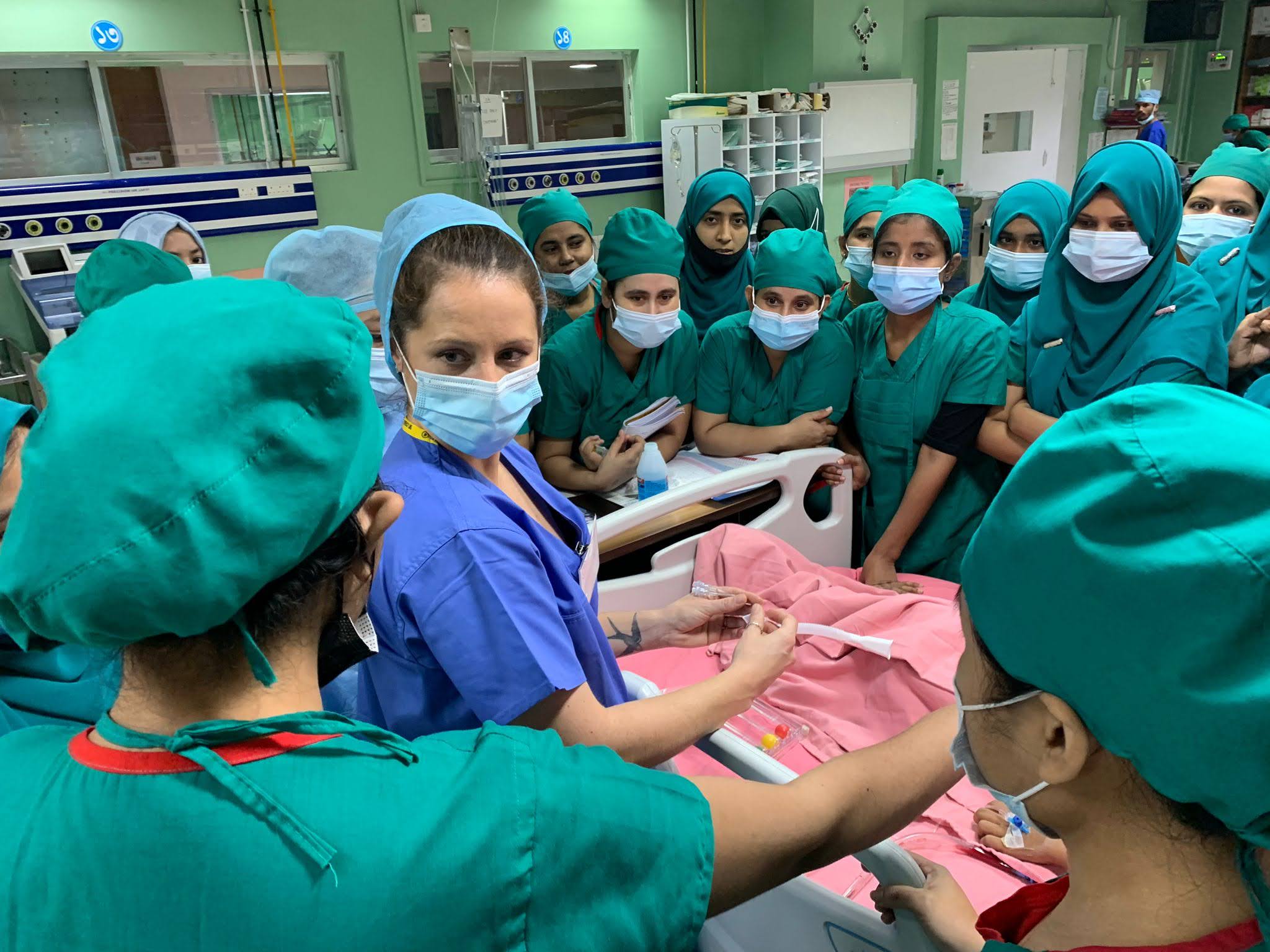
The medical volunteers have inspired us with their eagerness and enthusiasm to teach our staff and their cordial approach to implementing standard protocols.
One way they have changed how we care for our patients is our intensive care unit (ICU) nurses started practicing some safety protocols that they have shown and we started daily handover at the morning along with written handover sheet as suggested by Dr. David Finn.
KOCHI, INDIA
Dr. Brijesh P K, Clinical Professor, Amrita Hospital, Kochi, following the recent surgical workshop held there:
We would like to thank Dr. Mohan Reddy and Mr. Clinton Jones for taking time off their busy schedule, visiting us and teaching us the advances in pediatric cardiac surgery and perfusion techniques. Their commitment to teach and contribute to pediatric cardiac surgery is truly inspiring.
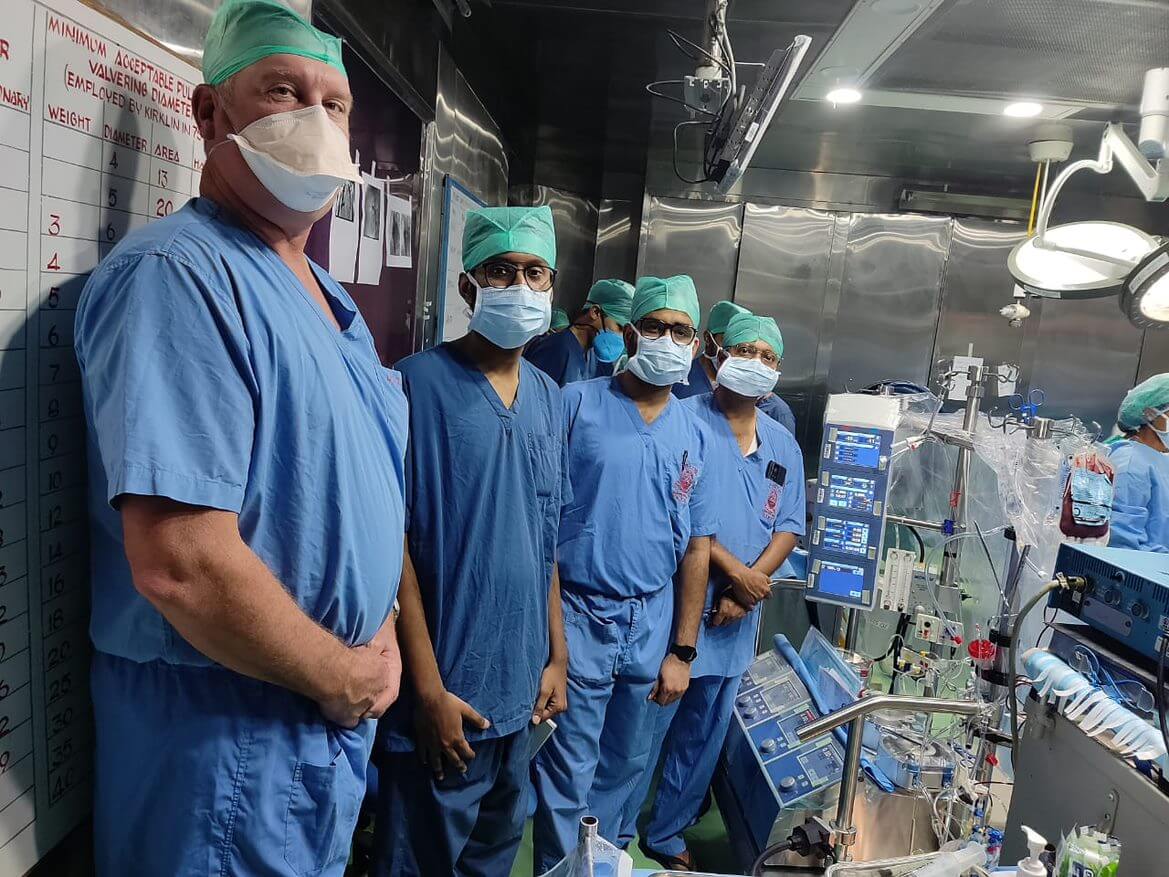
Each visit has been an amazing experience and helped us to advance in our field. It was truly an amazing experience. It was a tremendous learning week for all of us as well as for the visiting perfusionists from Children’s HeartLink partner sites (Postgraduate Institute of Medical Education and Research, Rabindranath Tagore International Institute of Cardiac Sciences and G. Kuppuswamy Naidu Memorial Hospital).

